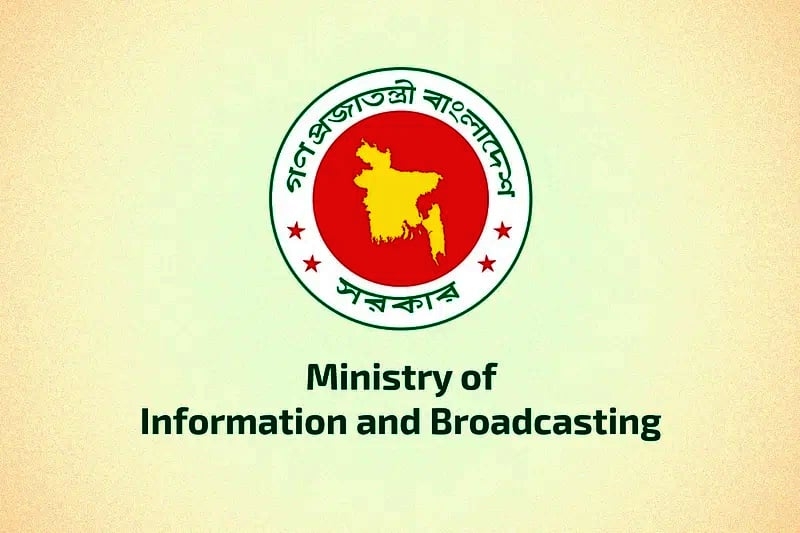- Body of Osman Hadi Returns to Dhaka From Singapore Late |
- Fakhrul condemns attacks on media, calls for unity, justice |
- 2 cops among 4 hurt in clash outside Indian Assit H.C. in Ctg |
- Inqilab Moncho urges people to avoid violence |
- Hadi’s death: Prothom Alo, Daily Star offices set afire |
Info Ministry’s Steps to Strengthen Journalism & Honor July Spirit

The Ministry of Information and Broadcasting has launched a series of initiatives aimed at advancing journalism, preserving the legacy of the July Revolution, and promoting the values of freedom and justice in Bangladesh. These measures include producing documentaries on the overthrow of fascism, the July Revolution, and the continued fight for democracy, while also supporting the needs of journalists who played pivotal roles during the uprising.
Key initiatives include the repeal of the controversial Cyber Security Act, which had been used to stifle press freedom, and ongoing efforts to reform the salary structure for journalists. In addition, the Ministry is reviewing cases filed against journalists in the aftermath of the July 1st protests and providing financial assistance to the families of martyrs, injured journalists, and those in need.
The Ministry has also forwarded a list of journalists who were injured or martyred during the July uprising to the Bangladesh Journalists Welfare Trust, facilitating financial aid for 350 journalists. Furthermore, the Trust has introduced scholarships for the children of meritorious journalists. To address legal challenges faced by the press, an eight-member committee has been formed to assess cases against journalists.
In the past 100 days, the Bangladesh Journalists Welfare Trust has disbursed over 2.36 crores BDT to affected journalists. Several other programs aimed at supporting the press and fostering media independence are also in progress.
The Ministry has also undertaken a significant reorganization of various committees, including the National Film Advisory Committee, the Bangladesh Film Certification Board, and the Bangladesh Journalist Welfare Trust. A new search committee has been formed to propose qualified candidates for key positions within the Ministry and related bodies.
In an effort to honor the spirit of the July Revolution, public media outlets such as Bangladesh Television (BTV), Bangladesh Betar, Bangladesh Sangbad Sangstha (BSS), the Press Institute of Bangladesh (PIB), and the Department of Films and Publications (DFP) have been actively involved in producing relevant programs. These include documentaries such as Agamir Bangladesh, The Diary of Fascism, The Stories of Suppression, and The Voices of Martyrs’ Families, as well as programs highlighting the oppression of the ousted fascist government and the heroism of the July uprising.
In addition, BTV has aired programs that reflect on the impact of the fascist regime and the ongoing struggle for democracy, while the Mass Communication Department has conducted a series of activities— including mikings, screenings of 527 documentaries and films, and organizing 119 courtyard meetings— to raise awareness about corruption and the importance of building a discrimination-free Bangladesh.
Bangladesh Betar’s programming in the last 100 days has focused on discussions of state reforms, the movement for a discrimination-free country, and the role of youth post-uprising. In particular, the station featured musical ceremonies commemorating the Chatra-Janata movement and discussions on issues like money laundering and market monopolies.
Bangladesh Sangbad Sangstha (BSS) has published over 140 stories covering the sacrifices of martyrs, the struggles of injured individuals from the July uprising, and investigative reports on the corruption and human rights violations committed by the previous government.
The Press Institute of Bangladesh (PIB) plans to release two special editions of Nirikkha, a journal focused on media and journalism, featuring stories on the anti-discrimination student movement, speeches from key political figures, and the role of media in the July uprising. Additionally, PIB will publish 20 feature stories on martyred students and the role of graffiti in youth activism.
The Bangladesh Cinema and Television Institute (BCTI) organized a seminar on the role of media in shaping a discrimination-free future, bringing together students, faculty, and Ministry representatives to discuss these pressing issues.
The Bangladesh Press Council has also held three meetings with media stakeholders to foster good governance in media organizations, aiming to eliminate discrimination and ensure a media-friendly environment that upholds journalistic ethics and independence.
Finally, the Ministry has directed the Department of Films and Publications (DFP) to produce additional documentaries documenting the misdeeds of the ousted government, including corruption, extrajudicial killings, the suppression of free speech, and the destruction of the electoral system.
These efforts reflect the Ministry's commitment to upholding the values of justice, freedom, and integrity, while strengthening the role of journalism in Bangladesh’s ongoing journey toward democracy.

